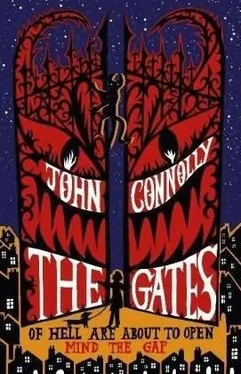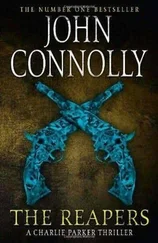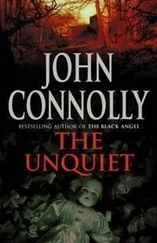Unfortunately, not all demons were like the thing in the pond. As Nurd sneaked through the town, trying to make his way to the portal, it became clear that the Great Malevolence’s advance guard consisted mainly of some spectacularly vile entities. There was clear evidence of demonic nastiness to be seen: three elderly male members of the Biddlecombe Shooting Club, who had been taking potshots at clay pigeons when the invasion began, had made the mistake of turning their shotguns on a gorgon, its hair a mass of hissing serpents and its eyes so black that they were less organs of sight than dark vacuums, or jellied orbs of nothingness. The shotgun pellets had bounced off the gorgon’s body, and the three old gents had immediately been turned to stone when they caught sight of the creature’s face, so that they now formed an unusual piece of public statuary outside the post office.
There was a lot more blood in the butcher’s shop than there should have been, as the smell of raw meat had attracted a troop of unpleasant carnivores, hunched beings with white flesh that hung from their frames like wax from a melting candle, their heads smooth but eyeless, their nostrils stretched back against their skulls as though unseen fingers had inserted themselves into the holes and pulled hard. The butcher, Mr. Morrissey, had only a few seconds to register the awfulness of the creatures that were invading his premises before their mouths opened, and their fine, sharp teeth were revealed, and they descended upon the hanging carcasses and, in their frenzy, upon Mr. Morrissey himself. When they were done, only bare bones, animal and human, remained, along with Mr. Morrissey’s tattered straw hat.
Two members of the Biddlecombe First XV rugby team had been swallowed up during evening training when, somewhat against the laws of nature and, for that matter, rugby, a pair of fins had erupted from the ground and the unfortunate players were dragged beneath it by what very much resembled sharks armed with webbed claws for digging. The rest of the team had promptly harpooned the monsters with the corner flags.
A platoon of imps, two-foot-high red demons armed with small pitchforks, had attacked a florist’s shop, only to discover that they were all allergic to pollen. Now they were staggering and wheezing all over the street, their eyes streaming and their noses running. This made them easy prey for what was, presumably, the irate owner, a large woman wearing an apron depicting a smiling sunflower, who was beating the imps into submission with a broom.
That was another thing Nurd noticed: the demonic forces were not having an easy time of it. The humans were fighting back. He saw a man on a lawn mower chase a snake demon and turn it into something mushy beneath his blades. A group of schoolchildren dressed as ghouls had encountered half a dozen real ghouls in a park. The ghouls, who were thin and pale and not very interesting looking, seemed a lot less terrifying than the schoolchildren, who had gone heavy on the artificial blood. This impression was confirmed when they began pelting the real ghouls with stones, forcing them to beat a hasty retreat and barricade themselves in a hat shop. The members of the Biddlecombe Ladies’ Choral Society had trapped a raiding party of demon dwarfs in a car park and, using their handbags and songbooks, had reduced them to small piles of pulp wearing hats with bells on the end. Nurd saw parties of humans armed with pitchforks, bats, and brush handles, determined looks on their faces as they marched out to reclaim their town. He wished them luck, knowing that when the Great Malevolence came it would all be over for them.
Nurd stepped over a wheezing imp that had staggered into his alleyway. The imp sneezed once, then expired, turning to wisps of smoke that drifted away on the night air. Nurd wondered if the Great Malevolence had anticipated what would happen to his forces once they crossed over from their world into this one: they could be killed. Oh, not permanently killed, but temporarily disposed of, as it were. Mortal rules applied in this world. There was simply not enough demonic energy here to sustain the entities, so that when they died their essence was dispersed, to be absorbed into the larger energy surrounding the Great Malevolence, there to be reconstituted and sent back into battle. The humans couldn’t win, not in the end. All they could hope for were small victories over an enemy that would simply return again in time.
And even that would change once the Great Malevolence crossed over, for he would bring with him all of his evil power, and this world would be transformed into a new Hell.
In the distance, behind some houses, Nurd could see a haze of blue lightning, and he knew that there lay the portal, the gateway between worlds. It was his way home. He thought almost fondly of Wormwood. Almost. Then he remembered Samuel, and hoped that the boy was safe. He wondered if he should try to look for him, but what could he do if he did find Samuel? Take him back to the Wasteland, even if such a thing were possible? No, Samuel would just have to fend for himself, but the thought of the boy in danger or in pain made Nurd feel guilty and sad.
Nurd left the alleyway and began moving in the direction of the light. He decided that it would be best to stay off the streets, so he climbed a garden wall and used the hedges and bushes for cover, advancing from garden to garden, sticking to the shadows.
He was in his third garden when his skin began to tingle. There was great power nearby. He could sense it. He peered through a gap in a hedge and spied a pair of creatures, one spiderlike, the other a huge toad, scuttling and hopping down the street. He recognized them both.
Nurd sank to the ground and tried to make himself as small as possible. This was grave news. Those two demons were bad enough, but they were merely servants of a greater evil. Where they went a being infinitely worse inevitably followed, a being intimately acquainted with Nurd and his wrongdoings. That being was Ba’al. Ba’al, the Great Malevolence’s trusted lieutenant, the one who had condemned Nurd to eternal banishment, had already crossed over, and Nurd had a pretty good idea of where the senior demon would be.
Ba’al would be waiting at the portal for its master to arrive.
XXIX In Which Nurd Proves to Be Rather Decent, Actually
IT WAS SAMUEL WHO spotted what appeared to be a demon hiding behind the hedge in the front garden. Crouching behind a hedge didn’t seem like very demonic behavior to Samuel, whose experiences of demons until now had shown him that they were variously frightening, puzzling, or, in the case of the one that had briefly occupied the space beneath his bed, simply not very good at their jobs; but so far he had encountered only one that appeared to be cowardly.
“What do you think of that?” Maria asked him, as they stood in the darkened kitchen, watching the demon.
“Maybe it’s planning to jump out at someone,” said Tom.
“It’s a him, not an ‘it,’” said Samuel. “His name is Nurd, and he’s the one who popped up in my bedroom. He’s obviously frightened. You can see that from here.”
“Well, I don’t really fancy asking this Nurd about his problems,” said Tom. “’Excuse me, Mister Demon, is ‘oo frightened? Is ‘oo having a bad day?’ I mean, he’s a demon. He’s supposed to be frightening us. It would have to be something pretty terrible to make a demon tremble.”
They were silent as they considered the implications of what Tom had just said. What could be so frightening that even a demon would be terrified by it? Samuel watched Nurd. He now appeared to be biting his nails nervously. Nurd may have been a demon but Samuel knew that there was some good in him, even if Nurd had wanted to rule the world. Anyway, what was that old saying, something about an enemy’s enemy being your friend…?
Читать дальше












